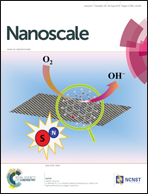Recent advances in alternative counter electrode materials for Co-mediated dye-sensitized solar cells
Abstract
Recently, considerable attention has been paid to dye-sensitized solar cells (DSSCs) which are based on Co2+/Co3+ redox shuttles, because of their unparalleled merits including higher redox potential, reduced corrosiveness towards metallic conductors, low costs and high power conversion efficiencies (PCE) (13%). The counter electrode (CE) is an essential component in DSSCs, and plays a crucial role in catalyzing Co3+ ion reduction in Co-based DSSCs. In this mini-review, we review recent developments in CE materials for Co-mediated DSSCs including: noble metal platinum (Pt), carbon materials, transition metal compounds (TMCs), polymers, and their corresponding hybrids, highlighting important contributions worldwide that promise low cost, efficient, and robust Co-mediated DSSC systems. Additionally, the crucial challenges associated with employing these low-cost CE catalysts for Co-based redox couples in DSSCs are stressed.


 Please wait while we load your content...
Please wait while we load your content...